

Nanotechnology: The Basics. About the Course Nanotechnology is an exciting research area that spans disciplines from electrical engineering to biology.
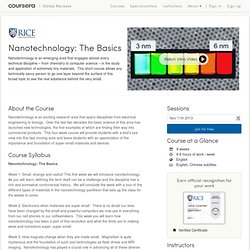
Over the last two decades the basic science of this area has launched new technologies, the first examples of which are finding their way into commercial products. This four week course will provide students with a bird's eye view into this fast moving area and leave students with an appreciation of the importance and foundation of super-small materials and devices. Course Syllabus Nanotechnology: The BasicsWeek 1: Small, strange and useful! Week 2: Electronics when materials are super small. Week 3: How magnets change when they are made small. Week 4: Shedding light on nanoscale materials and photonics. Recommended Background We expect some knowledge of freshman chemistry and physics, as well as algebra. Introduction to Statistics Course (ST101) Passion Driven Statistics. Statistics One. About the Course Statistics One is designed to be a comprehensive yet friendly introduction to fundamental concepts in statistics.
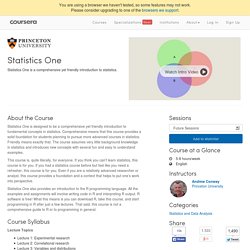
Comprehensive means that this course provides a solid foundation for students planning to pursue more advanced courses in statistics. Friendly means exactly that. Intro to data science. Scientific computing. Mathematical Biostatistics Boot Camp. Linear and discrete optimization. About the Course This course serves as an introduction to linear and discrete optimization from the viewpoint of a mathematician or computer scientist.
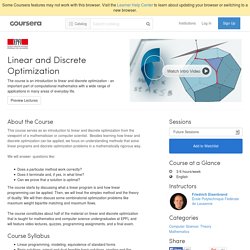
Besides learning how linear and discrete optimization can be applied, we focus on understanding methods that solve linear programs and discrete optimization problems in a mathematically rigorous way. Discrete Optimization. Introduction to Mathematical Thinking. Writing in the Sciences. Science from superheroes to global warming. About the Course Have you ever wondered if Superman could really fly?
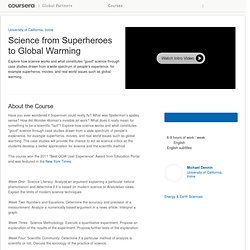
What was Spiderman's spidey sense? How did Wonder Woman's invisible jet work? What does it really mean for something to be a scientific "fact"? Explore how science works and what constitutes "good" science through case studies drawn from a wide spectrum of people's experience, for example superheros, movies, and real world issues such as global warming. This course won the 2011 "Best OCW User Experience" Award from Education Portal and was featured in the New York Times.
A Look at Nuclear Science and Technology. Algebra. About the Course This course is taught so that students will acquire a solid foundation in algebra.
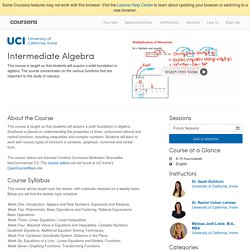
Emphasis is placed on understanding the properties of linear, polynomial rational and radical functions, including inequalities and complex numbers. Students will learn to work with various types of functions in symbolic, graphical, numerical and verbal form. The course videos are licensed Creative Commons Attribution-Sharealike-NonCommercial 3.0.
The course videos can be found at UC Irvine's OpenCourseWare site. Pre-calculus. About the Course Through this course, students will acquire a solid foundation in algebra and trigonometry.
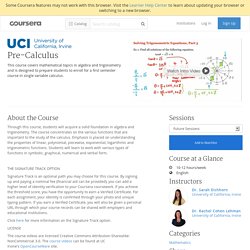
The course concentrates on the various functions that are important to the study of the calculus. Emphasis is placed on understanding the properties of linear, polynomial, piecewise, exponential, logarithmic and trigonometric functions. Students will learn to work with various types of functions in symbolic, graphical, numerical and verbal form. Signature Track is an optional path you may choose for this course. Click here for more information on the Signature Track option. Differential Equations in Action Course (CS222) When does the course begin?
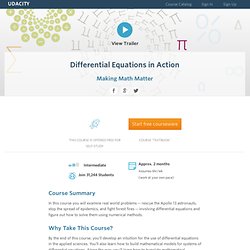
This class is self paced. You can begin whenever you like and then follow your own pace. It’s a good idea to set goals for yourself to make sure you stick with the course. Calculus: single variable. Introduction to Physics Course (PH100) When does the course begin?
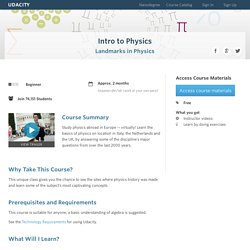
This class is self paced. Chemistry: Concept Development and Application. This course will cover an introduction to the atomic molecular structure of matter, similar to a typical first semester General Chemistry course.
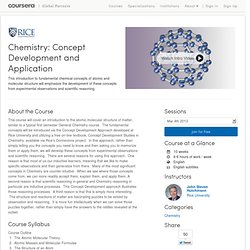
The fundamental concepts will be introduced via the Concept Development Approach developed at Rice University and utilizing a free on-line textbook, Concept Development Studies in Chemistry, available via Rice’s Connexions project. In this approach, rather than simply telling you the concepts you need to know and then asking you to memorize them or apply them, we will develop these concepts from experimental observations and scientific reasoning. There are several reasons for using this approach. One reason is that most of us our inductive learners, meaning that we like to make specific observations and then generalize from there.
Many of the most significant concepts in Chemistry are counter-intuitive. The class can be taken by someone with no prior experience in chemistry. An online quiz will be associated with each topic. How Things Work 1. Exploring Quantum Physics. About the Course Quantum physics is the foundation for much of modern technology, provides the framework for understanding light and matter from the subatomic to macroscopic domains, and makes possible the most precise measurements ever made.
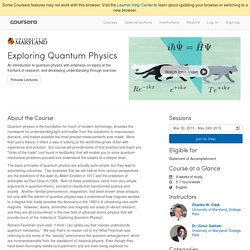
More than just a theory, it offers a way of looking at the world that grows richer with experience and practice. Our course will provide some of that practice and teach you "tricks of the trade" (not found in textbooks) that will enable you to solve quantum-mechanical problems yourself and understand the subject at a deeper level. The basic principles of quantum physics are actually quite simple, but they lead to astonishing outcomes. Two examples that we will look at from various perspectives are the prediction of the laser by Albert Einstein in 1917 and the prediction of antimatter by Paul Dirac in 1928. Richard Feynman once said, “I think I can safely say that nobody understands quantum mechanics.” Quantum Mechanics and Quantum Computation. Intro to astronomy. Galaxies and Cosmology.